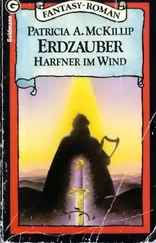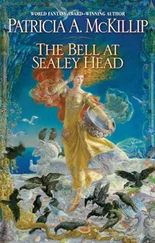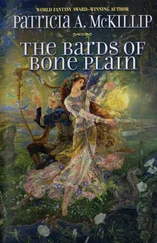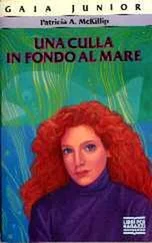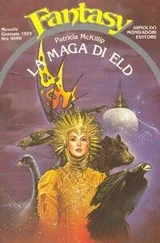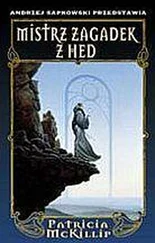She watched him motionlessly, intensely, as she watched the images moving through the mirror. Then, her whole body prickling with astonishment, she realized that he was neither reflection nor thread, but as real as she, riding alone into Skye. The beginning of his journey, his tale, lay in the unknown land behind him; the ending was hidden somewhere in Skye. At the foot of the slope he turned north, toward three hills that faced one another, so alike in their wide, smooth lines that they seemed reflections of one another. Three Sisters, they were called, by those who saw them from the south; farther north, they were known by other names.
It was late in the day for such lonely traveling, but the knight would not have seen the village lying between the sudden edge of the world and the sea. The only thing visible of Stony Wood from that distance would be the cluster of oddly shaped stones that might have been wood once, long before there was a village, or even the word for it. Now they resembled trunks and stumps still rooted in the earth and standing. Some were white as bone. Others were variegated and luminous with color, as if they might be turning, more slowly than the stars turned, into shell instead of stone.
“If he is real,” she whispered suddenly, her lean fingers digging into the grass roots, “then so might be everything in the mirror.”
She rose impulsively, wanting to catch up with the knight and ask him. She was barefoot, but he was riding slowly. He must stop eventually to sleep; if she could keep him in sight, she would find his fire beside a stream, or his horse in an inn yard. One of the wild horses roaming the plain might be in the mood to let her ride it. She bounded a step after the knight and then a voice wound around her ankle and pulled her motionless.
“Melanthos!”
She turned, knowing that of all the many things she could not explain to Anyon, running barefoot after a knight of Gloinmere would be foremost among them. He was already upset with her. Anyon, she thought, was a horse turned human: wild and beautiful, black as night, prone to flaring its nostrils and rolling a wide, nervous eye at anything unpredictable. His father owned half the sheep around them. Anyon sheared the sheep, spun wool into yarn, and wove it into blankets. His intricate and beautiful designs had traveled beyond Stony Wood, up and down the coast. He would spend a night making dyes to match the colors in his head without feeling the need to tell Melanthos. Yet he stood in front of her now, tossing his black hair off his brow, his fingers dyed blue, his dark, liquid eyes wide with exasperation. The sight of his restless beauty against the sky and the wind-scrolled sea took her breath away. She wondered, amazed, what he saw in her tall, scant body, her unkempt hair, her fey, murky eyes full of marsh lights. Whatever it was struck him as mute as she a moment. He went to her, slid one strong blue hand beneath her hair, and kissed her as if he had not seen her for months. She caught her balance, blinking as he surfaced for air. So did he, staring at her as if she had cropped up out of the harsh, beautiful land he loved, like a tor or a twisted tree. Then he remembered that he was angry.
“You vanished last night. All night. Without telling anyone—”
She pushed against his hold, impatient and mystified now, by whatever it was he wanted from her. “You must have guessed where I was. You couldn’t have thought I was under a bush with the sail maker’s son.”
“With him, no. Under a bush, maybe. Or in a wave, or on top of a mountain—I never know where to find you. You go where I can’t follow.”
“I was in the tower. You can walk up a stairway.”
“The tower won’t let me,” he said stonily. “It only wants you. What does it make you do up there?”
“I embroider. I’ve told you. You make blankets; I make pictures. You work all night sometimes without explaining. Why can’t you give me the same freedom?”
“You can come and go in my house when I work. I can’t. The tower keeps everyone away from you. And I can show you what I’ve done. You never show me anything.”
“I can’t,” she answered tautly. “I’ve explained that, too. The wind takes my pictures.”
“It does.” His arms were folded, as hers were; they glowered at one another, in squabblers’ stance, still close enough to kiss. “What picture did the wind take this time?”
She opened her mouth, hesitated, then said baldly, “Another tower.”
He tossed his hands, whuffing like a horse at a suspicious smell. “The wind. It’s magic that takes your pictures, magic that lured you to that tower and keeps you vanishing back into it.”
She shrugged, bewildered, smelling magic on the wind, even there, in the ancient scent of stone, the tease of brine. “So it’s magic. That’s an art, too, like weaving. What—”
“You never ask yourself who put the magic in the tower so that no one else can get up the steps. You don’t ask where the images in the mirror come from. Or if the magic is good or evil. You just do what you think it wants, and you want it more than you want me. Why?”
She was silent, thinking of the knight riding out of the mirror onto the plain behind her. “The mirror isn’t evil,” she said slowly. “It’s more like an eye, watching something happening in Skye. Sometimes it lets me see what it watches. And I embroider a picture of that. And then I leave the picture on the window ledge beside the mirror and I never see it again. Wind takes it somewhere, I suppose.”
“But what possesses you?” he demanded. “What compels you?”
“They’re beautiful,” she answered helplessly. “Like fragments of stories that I have to piece together to learn where they begin, and how they will end. Why do you spend days and weeks on your weaving?”
“To get it out of my head and into my hands, where I can see it and feel it. But the image in my head is mine, not in some mirror putting thoughts into my head—”
“It’s not—it doesn’t—” She held her breath and loosed it, then unfolded her arms and touched him. “Come with me and see.”
“Now?”
“Now.”
His eyes widened; she saw a muscle jump along his jaw. She knew what he feared. She felt it herself when she entered the old tower in the stone wood. There was something disturbing in the density of shadow, in the age of the stones, that seemed to speak of a time before words, before the trees clustered near it on the cliff had even thought of turning to stone. The broken, spiral steps suggested other things: they led away from life; they led to loss and endings, to the places where time stopped moving and nothing would ever happen again. But she found them unpersuasive. The tower had simply woven spells as harmless as cobweb to guard itself from intruders. What it protected in its secret heart was the strange, mysterious images in its mirror.
“If I come with you, you’ll see there’s nothing at all to fear.”
He snorted at that, and shied uneasily, as if the tower walls had fallen suddenly around him out of the sky. But he met her gaze, held it, drawing from her fearlessness. He said tersely, “Let’s go.”
As they crossed the plain, the sun began to sink behind a long line of billowing mist beginning to blow inland. At the broken edge of the plain, the village below revealed itself: a meandering network of cobbled roads and stone houses facing the sea. Its harbor was a deep, restless half-moon of water, its rounded sides enclosed by stone. Boats rolling into the harbor moored along its straight side. It was open to the sea at one end through a narrow channel in the rocks, tricky to navigate in good weather, impossible in bad. Half the villagers fished. The others raised sheep and goats on the wild land, which grew grass or rocks indiscriminately, but little else. Others, like the baker Melanthos saw walking to the seaward end of the harbor, tended to the daily needs of the village.
Читать дальше

